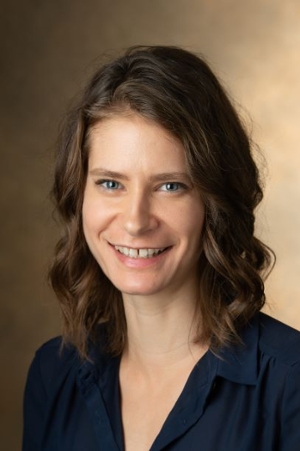SEGUE: SIUE’s Kooiman Discusses Anthropology Career and New Book
Posted November 18, 2021
 On this week’s episode of Segue, Southern Illinois University Edwardsville’s weekly radio program exploring the lives and work of the people on campus and beyond, College of Arts and Sciences (CAS) Dean Kevin Leonard, PhD, interviews Susan Kooiman, PhD, assistant professor in the Department of Anthropology.
On this week’s episode of Segue, Southern Illinois University Edwardsville’s weekly radio program exploring the lives and work of the people on campus and beyond, College of Arts and Sciences (CAS) Dean Kevin Leonard, PhD, interviews Susan Kooiman, PhD, assistant professor in the Department of Anthropology.
This episode of Segue airs at 9 a.m. Sunday, Nov. 21. Listeners can tune into WSIE 88.7 FM The Sound or siue.edu/wsie.
Kooiman joined the SIUE faculty in fall 2019. She earned a bachelor’s in anthropology in 2007 from the University of Wisconsin, Madison and a master’s in archeology from Illinois State University in 2012. Kooiman then attended Michigan State University where she earned a master’s in anthropology in 2015 and a PhD in anthropology in 2018. Her research and teaching interests focus on foodways, pottery and the precontact Indigenous peoples of Eastern North America, and she recently published a book titled “Ancient Pottery, Cuisine, and Society at the Northern Great Lakes (Midwest Archaeological Perspectives).”
“Welcome to Segue, Dr. Kooiman,” Leonard begins. “Tell us a little about yourself. How did you become interested in anthropology and archaeology?”
“I grew up on a dairy farm in Wisconsin, so I didn’t have a lot of exposure to anthropology or archaeology,” Kooiman states. “One thing I didn’t realize until another archaeologist talked about it on Twitter was a segment on the TV show ‘Reading Rainbow’ where LeVar Burton visited the Museum of Fine Arts in Boston and talked with a curator who was conserving a mummified cat from Egypt. This conservator had these tweezers and was removing ancient lint and dirt from this specimen.
“I had this recollection of afterwards going and getting lint from the dryer trap and finding a stuffed animal, putting it on there, getting tweezers, and replicating what I saw the conservator doing at that museum. Thinking back, that may have been the earliest instance of my interest in the past – at maybe six years old.”
She goes on to discuss an experience in middle school when her family sold the farm and moved into town, where she first had access to cable.
“That was the first time I watched shows about archaeology on Discovery Channel and The History Channel, and that was the first time I got really interested and said that I wanted to be an archaeologist,” reflects Kooiman.
“Were there a pivotal moment in which you realized you wanted to devote your career to anthropology or archaeology?” Leonard inquires.
“My freshman year of college at the UW-Madison, I was a pre-med student taking a lot of science classes,” explains Kooiman. “I was doing fine, but I wasn’t getting any sort of joy from them. As an elective I decided to take Introduction to Archaeology in my second semester. Taking that class felt like breathing. It was just natural. It just felt right. My hesitation towards committing myself at that moment was jobs. What could I do as an archaeologist?”
She decided to discuss careers in anthropology with her instructor. He assured her that both academic and nonacademic careers existed in the pathway, and she decided to pursue it as a career.
“You mentioned your archaeology professor at UW-Madison. Were there other important individuals who encouraged and supported you as you pursued a career in anthropology?” Leonard asks.
“There have been a lot of people who have supported my career and choices,” states Kooiman. “You mentioned my archaeology professor; his name is Dr. Jason Yaeger. Honestly since I talked to him about my career, he has been great in supporting me and finding opportunities and projects for me to work on, which was really vital for my early development and interest. I also did my field school with him in Belize, which is where you learn how to dig, and that was a life-changing experience. His wife Dr. Kat Brown, who is also an archaeologist, has always from a distance been an encourager and supporter of my career and given me really great advice.”
She also talks about her advisor during her master’s at Illinois State University, Dr. Jim Skibo, who is now the Wisconsin state archaeologist.
“He gave me my theoretical perspective on pottery analysis that I still hold today,” Kooiman says. “He’s continued to be a great mentor and a great friend to me. He actually told me I was PhD material long before I had interest in it or thought that I was PhD material, so he kind of planted that seed.”
Tune in at 9 a.m. Sunday, Nov. 21, to WSIE 88.7 The Sound to hear the entire conversation.










